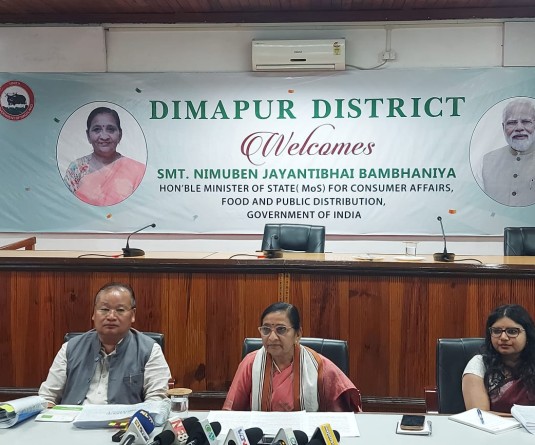Advisor, School Education & SCERT, Kekhrielhoulie Yhome.
Call for reforms in teacher appointment and school quality
Morung Express News
Mokokchung | November 2
A consultative meeting was held at the Deputy Commissioner’s Conference Hall in Mokokchung, where representatives from Ao Frontal Organizations, local churches, and educational leaders gathered to discuss critical issues in Nagaland’s education system. Dr Kekhrielhoulie Yhome, Advisor for School Education and SCERT, led the discussion, with Deputy Commissioner Thsuvisie Phoji presiding over the programme.
In his opening remarks, Marsanen Imsong, President of Ao Senden, highlighted several concerns on behalf of Mokokchung’s civil society. A key issue he raised was the rationalization process within the school education department. Imsong expressed support for this process but urged that it be implemented with careful consideration of the unique needs of rural educational institutions. He emphasized that frequent teacher transfers, especially mid-year, disrupt students’ learning and should be minimized.
Imsong also drew attention to the pressing shortage of qualified language teachers in government schools across Nagaland, warning that untrained teachers, despite speaking the local language, often lack the technical skills required for accurate teaching of grammar, spelling, and composition. He advocated for the appointment of linguistically and pedagogically trained educators to ensure quality instruction and preservation of tribal languages, which he stressed are endangered.
Dr Kekhrielhoulie Yhome, in his address, acknowledged the concerns raised and highlighted the urgent need to restore trust in government schools. Reflecting on the disparity between government and private schools, he noted that while private institutions continue to produce much of Nagaland’s leadership, government schools must also provide accessible, quality education, especially for students from economically disadvantaged backgrounds. “Where private schools cannot reach, government schools should ensure that quality education is available to every child,” he stated.
Dr Yhome revealed that the State-Level Education Committee recently granted provisional recognition to 69 additional schools across Nagaland. He assured attendees that reforms aimed at enhancing the quality of government schools are underway and that these changes will address some of the challenges facing the state’s educational institutions.
Addressing the high volume of teacher transfer requests, Dr Yhome clarified that the state does not operate on a quota-based transfer system. He emphasized that while transfers are essential for maintaining a balanced distribution of staff, they must not undermine the stability of students’ education, as echoed in Imsong’s earlier remarks.
The meeting concluded with an interactive session, during which community leaders and educators discussed potential strategies to strengthen education in rural areas and improve teacher training standards. The event closed with a benediction by Rev. Dr. Moa Tzudir, Secretary of Education & Literature at ABAM, who underscored the importance of collaborative efforts in building a brighter future for the state’s youth.





